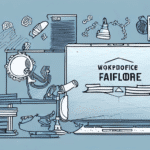Understanding the Challenges of Leaving a Company
Leaving a job is a significant decision that comes with its own set of challenges. Feelings of loyalty to your employer or colleagues can make the prospect of leaving daunting. Additionally, the stability and security of a current position often deter individuals from seeking new opportunities.
Emotional Attachment: Over time, employees develop strong emotional ties to their roles and the organizations they work for. These attachments can make the decision to leave feel like abandoning a part of oneself.
According to a Bureau of Labor Statistics report, job satisfaction plays a crucial role in employee retention. Understanding these emotional factors is essential when contemplating a career move.
Recognizing When It's Time to Move On
Identifying the right time to leave your current job involves self-reflection and awareness of your professional and personal needs.
Signs You Might Be Ready to Leave
- Lack of Growth Opportunities: If there are limited paths for advancement, it may be time to seek new challenges.
- Toxic Work Environment: Persistent negativity or unhealthy workplace dynamics can impact your well-being.
- Misalignment of Values: Ensuring your personal values align with your company's mission is vital for long-term satisfaction.
- Inadequate Compensation: Fair compensation is essential for feeling valued in your role.
- Poor Work-Life Balance: Consistently long hours without adequate personal time can lead to burnout.
Research from Gallup highlights that employees who experience burnout are 63% more likely to take a sick day and 2.6 times more likely to leave their current employer.
Preparing Financially and Emotionally for the Transition
Before making the leap to leave your job, it's crucial to ensure you're prepared both financially and emotionally.
Financial Preparation
- Create a Financial Plan: Outline your monthly expenses and identify areas where you can reduce spending.
- Build an Emergency Fund: Aim to save at least three to six months' worth of living expenses to cushion the transition period.
- Assess Benefits: Understand the implications on health insurance, retirement plans, and other benefits.
Emotional Preparation
- Seek Support: Talk to a career counselor or therapist to navigate the emotional aspects of leaving.
- Develop a Support System: Lean on friends, family, and professional networks for encouragement.
According to the American Psychological Association, having a strong support system can significantly reduce stress during career transitions.
Crafting a Strategic Exit Plan
Leaving on good terms is essential for maintaining professional relationships and securing positive references.
Steps to a Smooth Exit
- Provide Ample Notice: Typically, a two to four-week notice is standard practice.
- Complete Outstanding Work: Ensure all projects are up to date and document processes for your successor.
- Offer to Train Your Replacement: This gesture can leave a lasting positive impression.
- Express Gratitude: Thank your employer and colleagues for the opportunities and experiences.
Legal Considerations
Review any non-compete or confidentiality agreements you may have signed to ensure compliance post-departure. Consulting with a legal professional can provide clarity and prevent potential disputes.
Networking and Building Connections for Future Opportunities
Maintaining and expanding your professional network is crucial when seeking new job opportunities.
Effective Networking Strategies
- Stay Connected: Keep in touch with former colleagues and supervisors through platforms like LinkedIn.
- Attend Industry Events: Participating in conferences and seminars can open doors to new opportunities.
- Leverage Online Communities: Engage in industry-specific forums and groups to build your presence.
Data from LinkedIn suggests that 85% of all jobs are filled through networking, underscoring its importance in the job search process.
Finding Your Next Opportunity
Once you've decided to leave, having a clear plan for your next steps is essential.
Updating Your Professional Profiles
- Resume: Highlight your achievements and tailor your resume to the roles you're targeting.
- LinkedIn Profile: Ensure your profile is up-to-date and reflects your current skills and experiences.
Exploring New Opportunities
- Research Companies: Look for organizations that align with your values and career goals.
- Consider Freelancing: Temporary projects can help you gain new skills and expand your portfolio.
- Engage with Recruiters: Professional recruiters can provide insights and connect you with potential employers.
Staying proactive and organized during your job search can significantly enhance your chances of finding a role that aligns with your aspirations.
Reflecting and Reassessing Your Career Goals
Before transitioning to a new role, it's beneficial to take stock of your career aspirations and personal priorities.
Self-Assessment
- Identify Strengths and Weaknesses: Understanding your skills can guide your next career move.
- Set Clear Goals: Define what you want to achieve in the short and long term.
- Consider Personal Priorities: Ensure your career decisions align with your personal life and values.
Planning for the Future
Setting clear career goals and understanding the steps needed to achieve them can provide direction and motivation during your job search.
Maintaining Positive Relationships Post-Departure
Building and sustaining professional relationships even after leaving a company can be beneficial for future endeavors.
Staying Connected
- Regular Check-Ins: Periodically reach out to former colleagues to maintain the relationship.
- Share Your Achievements: Keeping your network informed about your professional milestones fosters continued engagement.
Offering Support
Providing references or recommendations for former colleagues can strengthen mutual professional ties and open doors for future collaborations.
In summary, while leaving a job is a challenging decision, approaching it strategically can lead to personal and professional growth. By understanding the reasons for your departure, preparing adequately, and maintaining positive relationships, you set the foundation for a successful transition to your next career opportunity.




















